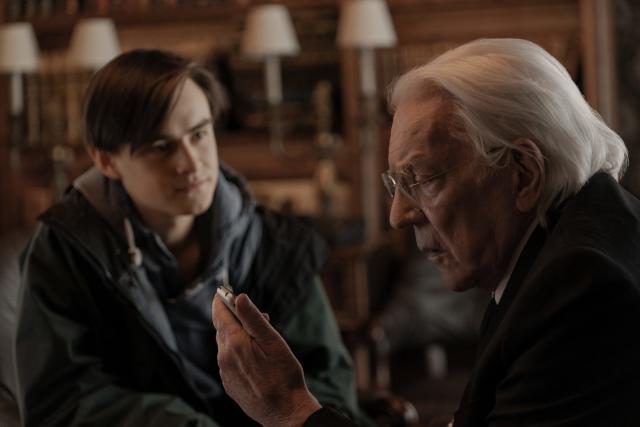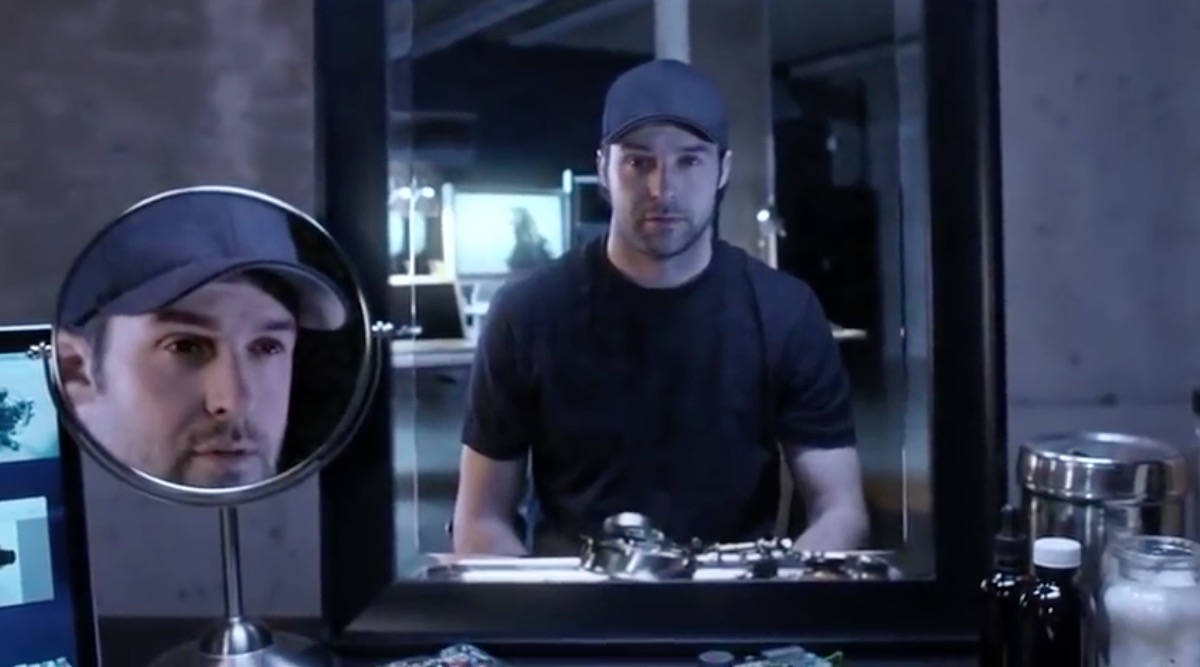There’s a scene in Mr. Harrigan’s Phone where the title character (played by Donald Sutherland) speaks to a young teenager named Craig (Jaeden Martell) about all his concerns stemming from the first iPhone. Harrigan talks about newspapers dying, disinformation spreading, and the validity of living with a digital presence. With the story originating from 2003, he would be a prophet. Algorithms and social media have completely changed how we take in information and interact with each other (for better and worse). The message of digital dangers is present in Stephen King’s adapted story from his 2020 “If It Bleeds” collection. The ingredient that seems missing is the scares — electing to be a ghost story/cautionary expose on how electronic addition shapes us.
Recent Sci-Fi anthology series like Black Mirror have shown how our technological advancements will doom us all in various ways. But writer/director John Lee Hancock shortens the scope to Harlow, Maine, where the narrator of Craig gives us the grand tour of the cozy town. Craig has been through tragedy, losing his mother when he was younger. Craig and his father (played by Joe Tippett) seem to have an ok relationship, but Craig mostly languishes in longing. When Craig was younger, an old rich man, Mr. Harrigan (Donald Sutherland), offered to pay Craig a five-dollar salary if he agreed to read to him three times a week. Harrigan’s eyes are failing him.
Craig obliges, and they go through books like Heart of Darkness and Dombey and Son — a little on the darker side of things. But Harrigan is more inclined to be lined up with the character of Mr. Scrooge from A Christmas Carol. He’s a cunning businessman whose ruthlessness and paranoia have encased him to live out his days alone. Craig values their time together and, eventually, breaks down some of the emotional walls Harrigan has built to keep people out.
Most of the first part of Mr. Harrigan’s Phone exclusively focuses on how Harrigan becomes a pseudo-friend and father figure to Craig. This would be fine for a drama film, showing how youth can bring an older man out of his curmudgeon shell. However, this storyline goes so long that the more supernatural elements feel like they are in a rush to be seen. With Mr. Harrigan’s Phone being set in 2003, it’s a time when smartphones first came into our lives. They’ve become prominent in this tiny Maine town; the high school cafeteria has sections where kids separate themselves by phone company. (This might be the eeriest thing).
When Craig gets an iPhone, he uses money from a lottery ticket to buy Mr. Harrigan one. After that, there’s a collection of scenes of Craig teaching Mr. Harrigan to use it — reminiscent of helping your parents with new electronics at Christmas time. Shortly after, Mr. Harrigan passes away, which sends Craig into an emotional tailspin. At the funeral, Craig places Mr. Harrigan’s iPhone in his casket and calls it from time to time. When a school bully suddenly passes away and messages appear in texts, Craig wonders if a ghostly presence is doing the bidding.
This film has many themes it wishes to put forth towards the audience, but doesn’t fully commit to the most substantial parts. While Mr. Harrigan offers a warning about digital dependency, he also has Craig make a promise — one that doesn’t pan out and given a finite time to establish why these are ominous words. Craig is undoubtedly dealing with a lot, blaming himself for his mother’s passing (and now, Mr. Harrigan). However, he has a father who is emotionally trying to connect with him. A biology teacher named Ms. Hart (Kirby Howell-Baptiste) helps him move through his bullying with kind words. However, it’s hinted that Craig may have a weird crush on her. The depth in how deep Craig goes as far as his mother is only given a small timeframe.
Finally, Mr. Harrigan’s Phone is quite unsure of what its boogeyman is. Could our reliance on technology have made us unavailable on a human level, or is it a ghost in the machine? There are some funny moments where kids will text other than talk directly to each other. However, Craig’s insistence on using his phone could be because he missed a friend. I’m sure people out there have kept contacts of family members or friends who have passed away in hopes you get to talk to them one more time. It’s unclear if the film wants to equate this phenomenon to an issue because we see it so infrequently.
There are many core ideas present that could be expanded beyond the surface level. Unfortunately, the story gets reduced to prototypical warnings of the future.
Photo Credit: Netflix













